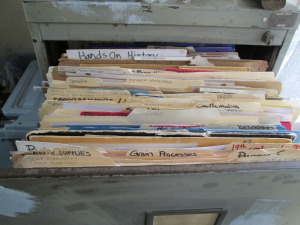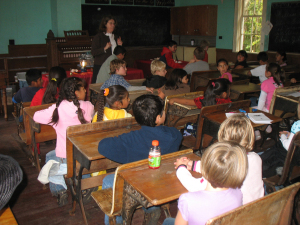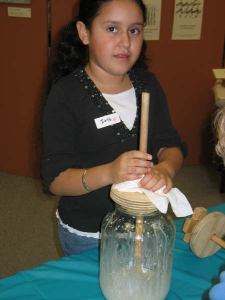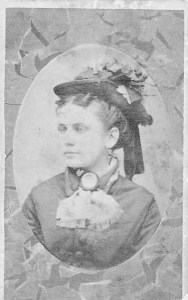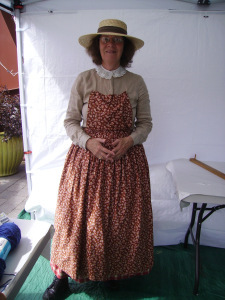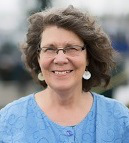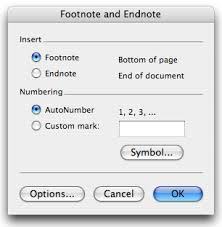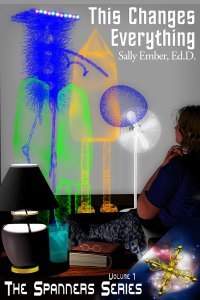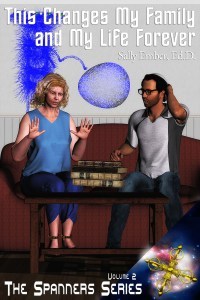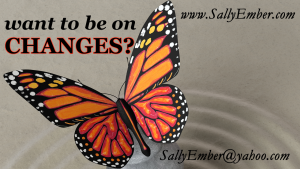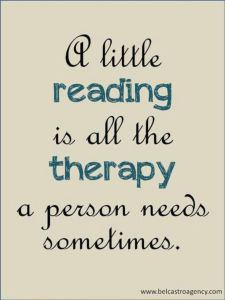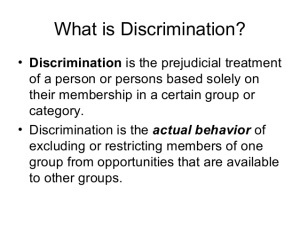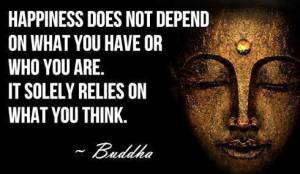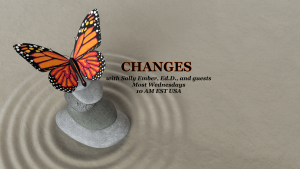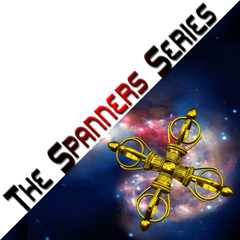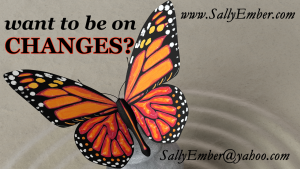Sally Ember's Blog, page 63
August 19, 2015
My History of History: Guest Blog Post from Janet Oakley, Historical Fiction Author/ Educator
I am so pleased to welcome Janet Oakley as my guest blogger today. Janet is an #historical #fiction #author and #educator who was my guest on CHANGES conversations between authors for Episode 21.
My History of History is today’s Guest Blog Post. Join the conversation, please!
For more information about how to reach Janet and know more about her writing, to become a guest on CHANGES or become a guest blogger on my site, see below this post.
Thanks for visiting!
My History of History
I have loved history since I was in grade school.
Maybe it was my mother’s stories about her family’s homesteading across the West, post-Civil War, or maybe it was the journals of my great-grandfather, a Union surgeon at the Battle of Gettysburg, or, Little House on the Prairie books.
In any event, while researching my senior thesis for my BA in American History, I had a wake-up call deep in the collections of the National Archives. I loved the research, the hunt for the unexpected piece of history, but I didn’t want to look like I lived there. My archivist looked like he hadn’t seen sun in 25 years.
That made a very big impression on my twenty-one-year-old self. I preferred presenting what I found in those old records and stories in ways that the public would understand. Thus, my passion for hands-on history was born.
I first discovered this approach to teaching history while a guide at Mission Houses Museum in Honolulu in the early 1970s. The storied history behind these buildings, one brought by sailing ship pre-fab all they way from Connecticut to Honolulu in 1821, was part of the tour. When no one else volunteered to give early morning tours to school kids, I said “Yes.”
I found making the story of missionaries and the royal Hawaiian children who were present at this site relevant to young 20th-century kids a challenge, but I soon found I loved making history come alive to them. For that, I pursued a teaching certificate.
Out in the Woods
Back on the Mainland a few years later, I scored a job with my local school district. At the time, every third grade went out to forested site to experience life as a 19th-century settler in the Pacific Northwest. By then, I had been participating in a museum program in the schools. From those workshops, I learned how to apply historical research to creating fun, hands-on activities, ranging from churning butter to candle-dipping to 19th-Century schooling. I’ve been doing it ever since.
One of the joys of doing this is seeing students (and many times, their parents) engage in activities from the past. For eleven years, I was Curator of Education at a county museum, where I worked with teachers and their students from eleven different schools.
I researched and created hands-on stations that explored mining ores and their uses, logging, seeds and butter-making, all historic occupations in the county. I also taught at the historic Rosario School.
Recently, I have been presenting workshops about pioneers and their use of 19th-Century technology and media at the SPARK Museum in Bellingham, which has an amazing collection of electrical science and sound that led to the development and improvement of modern radios.
During these years, I created social studies curricula for schools and parks, one of which is the San Juan Island National Historical Park on San Juan Island in the Pacific Northwest. For the past nineteen years, I have demonstrating 19th-Century foodways during their annual “English Encampment,” run by Miss Libby’s Academy.
Informing My Historical Fiction
I have an active public speaking life centered around local history topics and the historical fiction I write. Why do I continue to work with kids? Because I love history and I love teaching it experientially.
Understanding how things worked long ago or the customs and traditions of the times by trying on period clothing or cooking with a 150-year-old “receipt” (recipe) is one of the best ways to appreciate history and the ordinary people who lived it.
By the time this is posted, I will have talked to a group of Girl Scouts out at their rural mountain camp. My novel, Timber Rose, has inspired their leaders to invite me talk about the early women mountaineers who climbed mountains in skirts.
Can’t wait. Good times!
about Janet Oakley
(Janet Oakley) (J.L. Oakley) is the author of award-winning fiction. TREE SOLDIER, a novel of the Great Depression set in a Civilian Conservation camp, which won the 2012 EPIC ebook award for historical fiction as well as the 2012 grand prize with Chanticleer Book Reviews. Its prequel, TIMBER ROSE, is 2014 IndieBRAG recipient and a first place winner in the Chaucer Awards. The Jossing Affair, set in World War II Norway, is under consideration at a publishing house.
Janet also writes memoir essays and historical articles. Her work is published in the Cup of Comfort series, Historylink, the online encyclopedia of Washington State history, The Sea Chest, and Clover: A Literary Rag.
History is her first love. She writes social studies curricula for schools and historical organizations, demonstrates 19th-Century folkways, and was for many years the Curator of Education at a small county museum in La Conner, Washington, USA. In 2006, she was the manager of a History Channel grant, researching old court cases in early Washington Territory.
When she is not writing, she enjoys gardening, walking, and the company of the active writing community in her town.
Janet’s Links
Blog: http://historyweaver.wordpress.com
PINTEREST: http://www.pinterest.com/helebore/
Twitter: @jloakley
INTERVIEW: http://www.tvw.org/index.php?option=com_tvwplayer&eventID=2011100047
TIMBER ROSE
http://www.amazon.com/Timber-Rose-JL-Oakley/dp/149370981X
TREE SOLDIER was an ABNA 2014 Quarter Finalist and Chanticleer Grand Prize winner 2013, and an EPIC ebook Award winner in 2012
http://www.amazon.com/Tree-Soldier-J-L-Oakley/dp/1453896473/ref=tmm_pap_title_0
Janet Oakley was my guest on CHANGES conversations between authors, an almost-weekly, Google+/Youtube video chat show, on Episode 21. Watch conversations with my previous CHANGES guests any time: http://goo.gl/eX0D8T
OPENINGS occur frequently! #Authors, especially those in sci-fi/speculative fiction and who blog, learn more about and get yourself on CHANGES, and
#Readers, recommend an #author to be scheduled as a guest: http://goo.gl/1dbkZV
If you’d like to be a Guest Blogger, please visit my Guest Bloggers’ Hall of Fame and learn what’s involved.
Thanks for visiting, commenting, following, and enjoying this site! http://www.sallyember.com
Filed under: Blogging and others' content, CHANGES Episodes Tagged: *CHANGES*, *CHANGES* conversations between authors, historical fiction, Janet Oakley, Sally Ember







August 18, 2015
How I use Science Research in my Science-Fiction Writing for The Spanners Series
How I use #Science #Research in my #Science-Fiction #Writing for The Spanners Series
First, Some #Tech History
Typewriters to Word Processors
I am old enough to remember learning to type on a manual typewriter whose action was so “hard” or difficult that I had to slam each finger onto the keys to get them to hit the ribbon with enough force to get sufficient ink to mark the typing paper. If I were trying to make carbon copies, I had to hit the keys even harder or the copy wouldn’t be impressed with the keys enough for the carbon paper to work properly.
Luckily, I was already a piano student (from the age of 9) by the time I started typing (age 10) and I took my only formal typing class the summer I turned twelve. By then, my fingers were very strong. I do not know how others learned to type and made it work without being pianists. Even with my hours of piano playing every week, I still found it tiring and challenging to type with enough force on these typewriters to make the keys impress the carbon paper, especially when making more than one copy.
The first revolution was the IBM “Selectric” (invented in 1961, but got to me and my part-time jobs in St. Louis, MO, in the late 1960s and early 1970s), which had a spinning ball rather than key action. This made the typing of the letters cause the ball to spin, putting the typed letter in contact with the ink ribbon without having to use as much force. My days of a typewriter jam were almost over (I became an extremely fast typist, but the machine could not keep up!).
The early 1970s brought further great relief from typewriter drudgery with the electric typewriters (soft-touch, less force-required) and then the amazing automatic carriage return. Remember that lever we had to yank on at the end of every line? Gone!

Typewriter Jam
image from http://ecocatlady.blogspot.com
Finally, the best invention for writers and secretaries: the correction key, which worked by back-space-erase-retype action. Before this functional key existed, typists had to use special typewriter erasers (those round ones with the feathery ends so we could brush off the eraser dust from each part of the page) and carbon paper erasers for any mistakes, OR (usually) retype the entire page for one mistake! For larger mistakes or the carbon copies, we newly could use “Liquid Paper” or “Wite-Out”(THANKS, Bette Nesmith Graham, who invented this in her kitchen in 1956!), which also was a revolution in making typed pages appear mistake-free even when they were not.

Liquid Paper display at the Women’s Museum
image from http://en.wikipedia.org
Card Catalogs and Index Cards
Along with these trips down memory lane for typists, which brought us to word-processing/computer-like typewriters and, finally, word-processing software for home computers (the BEST!), we have the trajectory across the last fifty years for researchers. Remember those little pencils that were ubiquitous in libraries for use near the card-catalogs?
I used to spend hours or days or weeks cross-referencing, by hand, with my fingers and tired eyes, to find authors, titles, types of printed works, or microfiche/ microfilm copies of materials. Then, some were not allowed to be “checked out,” only used “in-house.” Or, some had to be requested via Interlibrary Loan, which could take months.
The photocopier was an electrifying (LOL) invention that allowed us to take home pages we wanted to study or read. We could mark them up and use them to take further notes on when items couldn’t be taken out of the library, but they cost a lot per page for my budget. I invented my own shorthand to take copious notes very quickly, a system I learned to use in lecture classes as well. I could quickly crib information from precious materials I couldn’t afford to make copies of in the large numbers of pages I needed for a project.
I am a speed-reader, fast note-taker, and quick thinker. Still, this type of research was slow and laborious since I had to read each page to determine what I wanted to notate, photocopy or ignore. Every resource also had long lists of their own resources which I usually had to follow-up on (and was grateful for the “trail”), but many items were one-of-a-kind and not available when I needed them.
Index cards, notebooks, looseleaf binders, photocopies, smudged ink and so much paper, paper, paper: I was drowning in it. We had to ORGANIZE: color coding, use of tabs, physically taping-moving-retaping the cards or notes on large pieces of paper or a bulletin board, wall or floor. It is at this point I would notice the gaps and have to trudge back (often through snow and ice; not kidding) to the library.
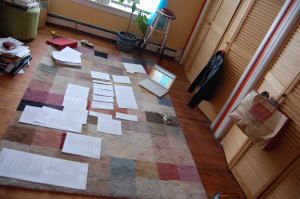
Floor Outlining
image from http://fairfieldwriter.wordpress.com
I was SO excited to use removable tags and “post-it” notes when they came into our lives: 1968, serendipitous discovery by Dr. Spencer Silver at 3-M, of the reusable glue; and Arthur Fry, mid-1970s for the mass-market applications, like “post-it” notes and removable tabs. If I only could keep it all straight and remember my own process. For example, was I using blue for my thoughts or quotations…?
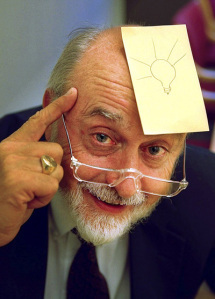
Arthur Fry, inventor of the “Post-It” note
image from http://en.wikipedia.org
Research Access and Writing, First Major Innovations
Fast-forward to the 1990s and (thanks to Al Gore…), the World Wide Web, or as it’s now known, the Internet. At first, not a lot was available to “laypeople.” Research didn’t change for me much during my graduate schools years (1991-96, for my Master’s and doctorate). The scanning interfaces were horrible: grainy and hard to read, with many odd mistakes and quirky formatting problems. Plus, most items weren’t scanned in and scanners were still prohibitively expensive and large, so not widely utilized. Professional journals, esoteric sources and other materials still needed to be found and used at libraries or in person.
The biggest boon and the one I still praise daily is the word processing personal computer. Best parts of that: copy, cut and paste functions. Gone forever are the days of using actual scissors (although I love that the “cut” icon is a pair of scissors). I no longer use sticky tape or post-its to move text around and it’s easy to create outlines that I can change quickly.
First-time, ever: specialized software programs that allowed us to create bibliographies as we write, using sources freely in our properly-positioned footnotes and endnotes, all automatically formatted to the chosen “style” guide, if we were clever enough to input the data correctly. Incredible!
Using Science Research in my Science-Fiction Writing
A Researcher’s Paradise!
Now, in the mid-20-teens, the Internet is alive, well, thriving and chock-full of information. Google, Yahoo, MSN, Wikipedia and other -pedias, specialized news sources and wikis along with nonprofit organizations’, professional associations’ and corporate websites populate the web with more facts than anyone could gather. I can capture and bring them to me via my home computer’s browser with the entry of a few simple search terms.
I am now overflowing with science breakthroughs, breaking news and older sources, with accompanying images, data and video/audio files. I am in a researcher’s paradise!
Word-Processing Software’s References and Resources
We have our own dictionary and thesaurus right within our word processing programs, with grammar and spell-checking functions operating within our own preferences and parameters. We can change these, add words and terms, personalize it all at will.
We can also become completely autonomous as bloggers, authors, producers of content of all sorts. We can independently research, write, edit and format an entire book in electronic or print format from our homes or offices: this is the true revolution of “desk-top publishing.”
My Evolving Research and Writing Process
Best part, for this sci-fi writer: science information on any topic, any time, at my fingertips. I have changed the way I write because of what is available and how I can use it in my books. I used to be an avid outliner (remember the notecards and color-coded tabs?), but usually, now, I mentally sketch out what I want to write about and what characters to include.
Then, throughout the year, I gather tidbits of information that I believe I may want to use. I get links to articles from organization’s or group’s pages’ and friends’ posts on Facebook, Google+, LinkedIn, Pinterest, Twitter and other social media sites.
When something piques my interest, I don’t have to go anywhere to read it. I don’t have to take notes or pay to copy the entire article. I don’t have to carry backpacks filled with heavy books, research journals and articles home.
Oh, no; I do not!
Instead, with a few “clicks,” I travel online to the site to copy and paste part or all of the article and its URL to a word processing document. It is then stored in my research folder with a specific title and date. I review it in its entirety or portions of it later, usually on the day I plan to consider using it.
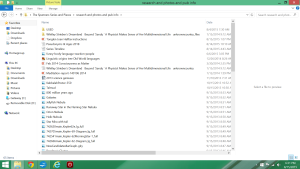
Screenshot of my research folder’s contents
When I’m ready to write, I begin to mine my research folder for its gold and other ores. When I find something I may want to use (for its facts, explanations, ideas or announcements), I copy and paste parts or all of each article right into my story or book draft. Sometimes, early on in my writing a book for The Spanners Series, I’m not sure what I’ll use, exactly, so I paste them all “at the end.”
When I’m ready to place items by subject somewhere in the chapters set-up, I move the paragraphs or entire articles to that chapter, by topic. As I write, I read more carefully to learn from the parts I’ve captured.
BUT, I am careful NOT to not use these authors’ exact words or do much paraphrasing. Instead, these snippets become my “notes,” acting like outlines, as guides. The sections I’ve pasted show me where I want to take my characters, my plot, or even my series by providing me with the science and facts to back up the next part of the world I’m building and the story I want to tell.
Once I’ve utilized this chapter’s store of ideas and facts (of course, attributing and giving credit in my Appendices when I use any part more literally than conceptually), I put each accessed article into my “USED” folder in my computer. Then, as I write, I delete the “notes” from the copied-pasted nonfiction/research articles’ sections of the draft.
All that is left in each chapter are my own ideas, in my words, with my characters, my plot. I then move on to another source or chapter section.
Summary of All the Changes: Pros and Cons
This process sometimes wreaks havoc with daily word counts, but I’ve learned how to distinguish consistently the “notes” sections separately from the written portions. What I love about this evolving process is how time- and resource-efficient and budget-friendly it is. There are only a few steps, with nothing to photocopy or borrow, no handwritten notes and bits of paper to misplace, fewer or no pieces of paper.
Plus, when I find out I’m missing something crucial or want to go in a new direction, I can open a browser tab and find a new information source in about one minute on my computer, from where I am already sitting. When inspiration strikes, I can “scratch” my creative “itch” immediately. Right away, I can find out if my new idea is feasible by setting the data up right within my draft, look it over, consider it all, then resume writing.
I can easily and quickly re-arrange entire sections, chapters, and themes, distributing ideas and information among my draft volumes as I write each one of my 10-book Spanners Series. For each of the three Volumes I have completed and the one I’m currently midway through, I have re-organized the chapters multiple times. I have changed sections, moved paragraphs and altered the events in timelines (my series includes multiple timelines) so that the chapter sequence changes almost weekly for a while.
I keep track of all these events, data and movement by using header dates for each chapter. I list them in my series’ spreadsheet by chapter and title. I also include some of the chapter’s content, characters and its current Volume number in the cell.
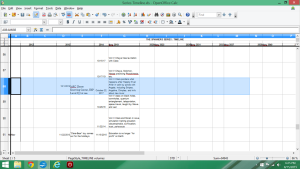
The Spanners Series’ timeline spreadsheet, screenshot
Given the fluid nature of ebooks and self-publishing, it would not surprise me to find out, years from now, that I want to re-arrange the sequence within or of the Volumes I’ve already published significantly! Doing that wouldn’t even be difficult, since self-publishers can withdraw and resubmit Volumes for distribution whenever we want.
Of course, there is one big problem: too much sitting! I have to remind myself to take breaks, get up, walk around, go swimming 5 – 6 times each week, take naps, go outside and walk around. The temptation to stay inside and keep working is so much greater than in the past because everything I need is “right here”!
I also have to be careful not to have another incident of RPI (Repetitive Stress Injury) to my arms, fingers, hands and wrists, which I had severely in my first semester of graduate school. I learned exercises, ways to sleep, the use of ice and NSAIDs to avoid overusing my home computer as I transitioned from relying on an electric typewriter. When there is no paper to load, no carriage level for returns, no ribbon to change and no carbon paper, we don’t move around physically enough.
We have to remember: raise our eyes to look out a window to change our eyes’ focus from near to far, remove our hands from the keyboard to stretch our arms, shoulders, necks, backs, fingers. We need to get up and actually (HORRORS!) leave the keyboard and screen for frequent breaks, or we will ruin our bodies.
Many (like my son, not pictured, but his set-up is similar) now use standing desks and ergonomically designed keyboards with vertical access to prevent the worst harm and future injuries. However, exercise and frequent “away” periods are the best ways to avoid physical problems from developing due to computer overuse.
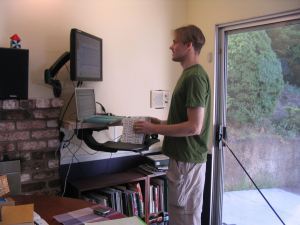
Ergonomic Desk and Keyboard Set-up
image from http://www.instructables.com
However, I would not trade the convenience of this era for all the manual typewriters and liquid paper in the multiverse. Thanks to all the inventors, developers, creators, scientists, researchers and writers who made/make this all possible for the rest of us!
This Changes Everything, Volume I, The Spanners Series, by Sally Ember, Ed.D., Permafree
Dr. Clara Ackerman Branon, 58, begins having secret visits from holographic representations of beings from the Many Worlds Collective, a consortium of planet and star systems in the multiverse. When Earth is invited to join the consortium, the secret visits are made public. Now Earthers must adjust their beliefs and ideas about life, religion, culture, identity and everything they think and are.
Clara is selected to be the liaison between Earth and the Many Worlds Collective and she chooses Esperanza Enlaces to be the Media Contact. They team up to provide information to stave off riots and uncertainty. The Many Worlds Collective holos train Clara and the Psi-Warriors for the Psi Wars with the rebelling Psi-Defiers, communicate effectively with many species on Earth and off-planet, eliminate ordinary, elected governments and political boundaries, convene a new group of Global Leaders, and deal with family’s and friends’ reactions.
In what multiple timelines of the ever-expanding multiverse do Clara and her long-time love, Epifanio Dang, get to be together and which leave Clara alone and lonely as the leader of Earth?
This Changes Everything spans the 30-year story of Clara’s term as Earth’s first Chief Communicator, continuing in nine more Volumes of The Spanners Series.
Are YOU ready for the changes?
http://www.amazon.com/dp/B00HFELTG8
https://www.smashwords.com/books/view/376197
This Changes My Family and My Life Forever, Volume II, The Spanners Series, by Sally Ember, Ed.D., @$3.99
Intrigued by multiple timelines, aliens, psi skills, romance and planetary change? Clara and the alien “Band” are back.
Now as Chief Communicator, Clara leads the way for interspecies communication on- and off-planet. Fighting these changes are the Psi-Defiers, led by one of the oldest friends of the Chief of the Psi-Warriors, its reluctant leader, Rabbi Moran Ackerman. Stories from younger Spanners about the first five years of The Transition fill Volume II.
How would YOU do with the changes?
https://www.smashwords.com/books/view/424969
http://www.amazon.com/dp/B00KU5Q7KC
This Is/Is Not the Way I Want Things to Change, Volume III, The Spanners Series, by Sally Ember, Ed.D., planned pre-orders 11/1/15 – 12/7/15 @$1.99; planned release 12/8/15 @$3.99; Cover Reveal 10/26/15!
Clara, Moran, Espe, Epifanio and the alien Band of holos are back. Psi-Defiers launch increasingly violent protests during this five-year Transition, attempting to block Earth’s membership into the Many Worlds Collective. To join, Earth’s nations and borders must dissolve and Psi-Warriors must strengthen in their battle against the rebels.
Clara, continuing as Earth’s first Chief Communicator, also juggles family conflicts and danger while creating psi skills training Campuses to help Earth through the Psi Wars. Clara timults alternate versions of their futures as the leaders’ duties and consciences force them each to make difficult choices across multiple timelines while continuing to train and fight.
Will the Psi-Warriors’ and other leaders’ increasing psi skills, interspecies collaborations and budding alien alliances be enough for Earth to make it through The Transition intact? If there is no clear path for Clara’s and Epifanio’s love, does she partner with Steve or go it alone?
What do you do with wanted/unwanted changes?
LINKS
http://www.sallyember.com main website
http://www.amazon.com/-/e/B00HEV2UEW author page
https://www.twitter.com/sallyemberedd Twitter: @sallyemberedd
https://www.facebook.com/TheSpannersSeriesbySallyEmber Spanners Series’ page on FB
https://www.facebook.com/sally.ember
http://www.pinterest.com/sallyember
http://goo.gl/tZKQpv Spanners Series’ page on Google+
https://plus.google.com/u/0/+SallySueEmber/about/p/pub Sally Sue Ember on Google+
https://www.youtube.com/channel/UCqnZuobf0YTCiP6silDDL2w/videos
https://www.goodreads.com/author/show/7237845.Sally_Ember
More purchase/free links on Kobo, ibooks and nook as well as reviews, book trailers, author interviews and readings, blog posts, research, series updates and more on Sally’s website: look right, scroll down. http://www.sallyember.com
Cover art and logo by Aidana Willowraven: http://www.willowraven-illustration.blogspot.com/
Filed under: All Volumes, Changes in Attitude, Changes in Latitude, Personal stories, Science, Science Fiction and Fantasy, The Spanners, This Changes Everything, This Changes My Family and My Life Forever, This Is/Is Not the Way I Thought Things Would Change, Volume I of The Spanners, Volume II of The Spanners, Volume III, Volume IV, Writing Tagged: biology, carbon paper, correction fluid, index cards, libraries, liquid paper, manual typewriters, meditation, metaphysics, neurobiology, neuroscience, notes, outlining, photocopies, physics, post-it notes, psionics, psychic skills, psychology, religion, research, Sally Ember, Sally Ember Ed.D Author, science, science fiction, The Spanner Series, word processing, writing







August 17, 2015
*CHANGES* Host’s Birthday Week’s Special Episode: Wed., 8/19, 10 – 11 AM Eastern time, USA
CHANGES conversations between authors Host’s Birthday Week’s Special Episode:
Wed., 8/19, 10 – 11 AM Eastern time, USA!
Please share!
Spanners Series and blog fans/followers, sci-fi/romance readers, fellow authors and viewers, please participate on the Google+ Event page for Episode 38. You may request a chapter or Volume for me, Sally Ember, Ed.D., to read aloud from (yes; I do voices). And, you may list your burning questions (PG-13, please) there.
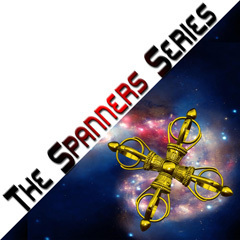
Vol III, The Spanners Series, release date: 12/8/15, $3.99
Pre-orders @$1.99, 11/1/15 – 12/7/15
Watch live if you can, but put your read-aloud requests and Qs on the G+ Event page, please! https://plus.google.com/u/0/events/cva08aii0mqetgdvi0i3c9m6klg
OR, watch and comment live on Youtube: https://goo.gl/qJLUQI
Even if we run out of time, I promise to answer all questions on my blog.: http://www.sallyember.com/blog
All purchase/ebook links, reviews, interviews and excerpts also there. Look right; scroll down.
OPENINGS for CHANGES in September and beyond! I welcome new/seasoned authors of any age, genre, publication method!
Watch conversations with my previous CHANGES guests any time: https://www.youtube.com/playlist?list=PLPbfKicwk4dFdeVSAY1tfhtjaEY_clmfq
Learn more about and get yourself on or recommend someone to be scheduled as a guest for CHANGES: http://sallyember.com/changes-videocasts-by-sally-ember-ed-d/
I hope to see you at the show!
Filed under: All Volumes, CHANGES Episodes, G+ HOAs, Google HOAs, Interviews with Sally as Author, Science Fiction and Fantasy, The Spanners Tagged: *CHANGES*, *CHANGES* conversations between authors, G+ HOA, live reading, Q & A, Sally Ember Ed.D Author, The Spanners Series, YouTube







August 15, 2015
Decoded octopus genome reveals secrets to complex intelligence
“The Spanners Series” features cephalopods, cetaceans, primates and many other species as full members of the Earth family once Earth enters into membership to the Many Worlds Collective! Check out more about the wonderful Octopus here!
 Originally posted on GarryRogers Nature Conservation and Science Fiction (#EcoSciFi):
Originally posted on GarryRogers Nature Conservation and Science Fiction (#EcoSciFi):
“The elusive octopus genome has finally been untangled, which should allow scientists to discover answers to long-mysterious questions about the animal’s alienlike physiology: How does it camouflage itself so expertly? How does it control—and regenerate—those eight flexible arms and thousands of suckers? And, most vexing: How did a relative of the snail get to be so incredibly smart—able to learn quickly, solve puzzles and even use tools?
“The findings, published today in Nature, reveal a vast, unexplored landscape full of novel genes, unlikely rearrangements—and some evolutionary solutions that look remarkably similar to those found in humans. (Scientific American is part of Nature Publishing Group.)
With the largest-known genome in the invertebrate world—similar in size to that of a house cat (2.7 billion base pairs) and with more genes (33,000) than humans (20,000 to 25,000)—the octopus sequence has long been known to be large and confusing. Even without a genetic map…
View original 68 more words
Filed under: Writing







Authors: Share Your Work!
Thanks, Brittney Sahin! Posted blurbs and links to all three of my “Spanners Series” books (so far)!
 Originally posted on brittneysahin:
Originally posted on brittneysahin:
It’s that time again.
Please share your book(s) now through August 17th
For those that are new to this post: Twice a month I invite fellow authors to share their WIP or their current works for sale. I invite everyone to post links to their personal websites, other social accounts, or advertise a link to BUY. Use this space to BRAG about what you are working on – or what you have published! Be proud of your hard-work & not embarrassed to self-promote!
If you have a book for sale (or upcoming)- I will add your book to my list of “authors to read” by the genre – See example here: Authors to Read!
For those who have posted before: Feel free to advertise again. Or- if you have a different book you would like me to add to the list (or different link to buy)- please include it.
Example:
Title. Genre. Release…
View original 29 more words
Filed under: Writing







August 13, 2015
“Family-Friendly” is a Thin Disguise for Discrimination: They are on the Wrong Side of History
“Family-Friendly” is a Thin Disguise for Discrimination:
They are on the Wrong Side of History
Who else is on the “wrong side of history” regarding expressions of and legal sanctions toward and behaviors sourced by prejudice, bias, discrimination, hatred against ethnic, racial, religious, gender and other social identity groups?
Adolph Hitler. Austria and Germany. George Wallace. Richard Nixon. Phyllis Schlafly. Anita Bryant. The United States of America. Several Catholic Popes. Margaret Thatcher. Great Britain. Mao Tse Tung. China.
The list is, unfortunately, endless, if we keep going into history and across the globe. Humans seem to have an unlimited ability to be irrational and small-minded.
Fortunately, we do learn. We do grow. Some more slowly than others, as we see all too often, but change we do. One of the main ways people change is through exposure, a personal “eye-opening” moment that educates them (“leads them out”) away from their irrationality and biases.
The other way is through enforcement, such as the enlightened few and the majority collaborating to change the laws that require citizens to change behaviors accordingly. When behaviors change, minds can follow: not always, and not completely, as we see with the laws of integration and other civil rights for Blacks in the USA NOT eliminating racial biases and racism, but these are certainly steps in the right direction.
The current social and political landscapes—right here, right now—are changing rapidly with respect to fairness, acceptance and legal rights for those with all sexual orientations and gender identities exactly as they did with racial intolerance in the 1960s.
As usual, some are being dragged, kicking and screaming, into this new way of being. They are simply not keeping up, are they? Laws often get “ahead” of some people’s mindsets. AREN’T WE LUCKY? The haters may keep on hating, but they have no legal, moral or individual “right” to impose their “opinions” any longer.
Some definitions, for those unclear on these concepts:
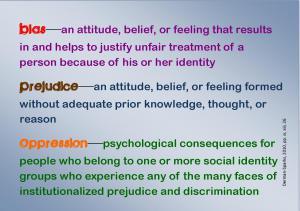
from: http://littlelaughter.wordpress.com
Current circumstances:
I am an author who publicly proclaims myself a feminist. Anyone who knows me or reads me online or reads my books also knows I am Buddhist, Jewish, and bisexual, and I am vocally an anti-discrimination, anti-oppression activist.
I am also a reader who occasionally does reviews. Therefore, I do agree that each reviewer has the right to refuse to review any book we do not want to review. We do not have to give reasons, either.
However, I do not agree with the opinions, prejudices and biases this reviewer expresses when she gives some (but not all) of her reasons for discontinuing her reading of and refusing to review my book.
In fact, when we allow such actions to be fueled in these ways, not commenting, not confronting, we are aiding and abetting the institutional oppression rampant in literary circles. “If you’re not part of the solution, you’re part of the problem” is never truer than in these circumstances.
Some would say that she would have been off not saying anything, but since she did, here we are.
Read below and comment, please! http://www.sallyember.com/blog
After finding me on a reviews-seeking site, this reviewer emailed me, saying that she wanted to review all three books in The Spanners Series. She wrote a few days later, saying she had started and was liking my first book.
Then, the next day, this potential reviewer sent me this email:
From: xxx
I will not be able to review your books. I have just come to a part that is [sic] conflict with my site. I have a family friendly blog and your book contains content that my readers would find offensive. It would also put at risk some of my advertising spots on my site that demand only family friendly content.
I understand that you were just trying to get across the point about non-discrimination but your content concerning sexual affiliation will not work with my site.
Best of luck to you,
xxx
“Hi, xxx,
“I have no idea what you mean by ‘not family-friendly’ or ‘offensive,’ since my books are accepted by ‘[Facebook authors’ group],’ a strict group on Facebook which promises readers fiction that won’t make them recoil. For example, I use no swear words stronger than ‘damn’ or ‘shit,’ there are no explicit sex scenes, no gratuitous or obvious violence, and no traumatic scenes in my books: they are PG-13.
“If you are objecting to any mention of or acceptance of alternative sexual orientations and gender identities to heterosexual or straight people or cis-gender people, if that would be something you or your followers find ‘offensive,’ then, please: DO NOT READ MY BOOKS.
“And, by the way, discrimination, bias and prejudice are NOT ‘family-friendly’ to any families I would want to be connected with, ever. Use of that terminology to describe what you are perhaps claiming is absurd.
“Since more than 10% of every population of humans on this planet are actually gay, lesbian or bisexual and at least 5% are transgendered, whose families are you ‘protecting’?
“If what I am assuming, in fact, are your positions, I find your views to be extremely offensive, and so would most of the rest of the world, at this point in time. Marriage equality and sexual identity acceptance are legal in many countries, including this one, and discrimination is NOT.
“I welcome you and your readers into the 21st century any time you’re ready to come.
“If I have misunderstood, I apologize. Please explain. I would welcome your further description of what, exactly, is ‘in conflict with’ your site and specifics as to your presumptions about your advertisers’ objections to the content of my books.”
Sally
She responded:
From: xxx
What is offensive is that you mention any sexual affiliation at all. I would not blurt out in a book that I was heterosexual. I would not refer to sex at all. It is irrelevant and has no place in a family friendly book. You can have any sexual orientation you want and that is your business but I don’t have to and will not promote it on my site. The fact that you felt you needed to make a political statement with your book is your business but I won’t be a part of it.
As I said Good Luck to you but I will not be doing this review.
xxx
Curious as what others who might be “in her camp” would say, I posted our email exchange on the group site I am part of, the one I mentioned, above, and asked for opinions.
I received the following anonymized responses (I didn’t include them all; some are repetitive or off-topic).
Then, I wrote a few responses, below.
Why do I bother? Because Education.
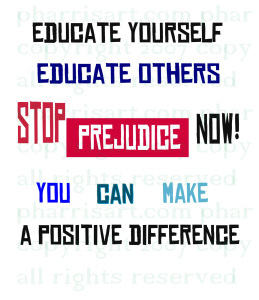
from: http://teachersteachfromtheheart.blogspot.com
“Need[ Facebook Group members]’ opinions, please! Just had this exchange with a potential reviewer and I’m burning mad. (She approached me, BTW, asking to review my books via a [reviews-seeking/reviewers-finding site] last week!).
“She emailed me this earlier today…” (same as above, posted)
FB group’s responses:
From AAA:
“She has the right to her viewpoint, and I don’t think she should be dressed down, scolded, or insulted for it. I thought your words were rather condescending and insulting.
“OTOH, she should have done her research first before approaching you, and rather than try to take YOU to task for what she didn’t agree with in your books, she should have just politely said ‘sorry, I was wrong, it’s not going to work out this time.'”
From BBB:
“The old saying I’ve tried to remember is not to lower oneself to another’s level in order to argue or debate. It’s not ever worth it.”
From CCC:
“It’s her site, she can do as she wishes, just as you are able to write about anything you want to. This enters into the forbidden realm of writers who snap at reviewers for not liking what they wrote. She didn’t give you a bad review on her site, which she could have. She simply declined to review at all. It could have gone a LOT worse for you.”
From DDD:
“Sally, I totally get where you’re coming from, having experienced this kind of reaction (my books include gay characters who are treated as normal people). I’m living vicariously through your email because I’ve wished I could say something like that to reviewers who’ve one-started me because of it. smile emoticon But I’m inclined to agree that it’s better to steer clear of these rhetorical boondoggles. I’d just let this go and get on with writing. Your audience is out there, but it’s not this lady or her blog followers.”
From EEE:
“It’s her site. She is entitled to her opinion and the way she manages her site. We have our rules here, but IMHO, even shit and damn are not family friendly. She was polite. I’m sorry that you were not.”
From FFF:
“I have to say also, the reviewer could have gone ahead with her review, as she’d promised you one. She could have been completely open and honest about her opinion, and put it on her public site.
“Instead, when she saw it was something that she didn’t believe she could endorse, she privately messaged you, letting you know that she’d have to back out.
“This was gracious of her to do.
“So to be treated badly was not something that I feel she deserved.”
From GGG:
“PG-13 does not constitute ‘family-friendly’ in my mind. I have a 9, 7 and 4 year old, and I don’t even let them watch most PG movies.”
From HHH:
“Unfortunately, I have to agree with what many others here have commented. In addition, I have to point out that you ASSUMED her problem with your book was the fact that there are gay characters. She simply wrote that she came ‘to a part’ that conflicted with her site. The thing that may have bothered her could’ve been profanity, or whatever else is in your book. It can be dangerous to reprimand someone for their stance – especially since she could always turn around and decide to write a poor review, or even one-star your book.
“On a personal note, I write both Christian AND secular stories (things that would give Junot Diaz a run for his money in the department of shock value). So I can honestly say that even the words you listed are not ‘family friendly,’ meaning appropriate for all ages. As far as homosexuality is concerned, I have a #LiveAndLetLive philosophy on life. That means that I do not judge someone else for their lifestyle choice. However, that doesn’t mean I want my six year old reading about it. Again, it’s a subject not necessarily appropriate for all ages.”
From Me:
to HHH: “She came right out and stated what her concerns were. I didn’t assume what she objected to at all. I assumed her reasons, because she did not state them. Also, I did not expect any 6-year-olds to read this book; it’s way too complicated and sophisticated. PG-13 is the rating i always state. Thanks for your comments, though.”
From JJJ:
“Wow. And she was so polite…”
From Me:
“Since when are expressions of bias, prejudice and discrimination ‘polite’??? If her objections were obviously about my having Jewish or Black characters, would you be defending her ‘family-friendly’ smokescreen???”
From JJJ:
“She made her reasons for choosing not to include your work on her site clear to you in a very polite manner. Tolerance works both ways.”
From Me:
“To JJJ and others here: I appreciate all your comments, but for some of you, I am disappointed. SOME don’t seem to know the difference between being ‘impolite’ and being against someone else’s being discriminatory, Number 1.
“Number 2, it is not the job of those who are not being tolerated to return such intolerance with tolerance. I was not ‘impolite’ to her: I was direct and I expressed my thoughts and feelings. I did not call her names, I did not insult her.
“Remember: she VOLUNTEERED to read my books and had already sent me an email prior to this saying how much she was enjoying the first one. Then, she came to a part she didn’t ‘tolerate,’ which she and her groups, of which some of you are obviously members, seem to think it’s just fine to insult and demean. That is plain wrong. She doesn’t have to like it. She could have just said “It’s not for me” and DNF or not even written me. But, she chose to ‘explain.’
“Those who are not heterosexual or cis-gender do not deserve to be treated as if we are threats, are wrong to be ‘this way,’ or by our very existence, are ‘problems’ for ‘families.’ We ARE in families!
“I will defend to my dying day the right of all who are discriminated against to object strenuously to such discrimination, wherever it appears, however ‘nicely’ it is phrased.
“Maybe some of you are too young or didn’t have these experiences, but I grew up in Missouri under Jim Crow laws. I grew up with signs on stores and country clubs that said : ‘No Dogs, No Jews, No Niggers Allowed.’ Should I have greeted those racists with ‘tolerance’????? I am a Jewish, female bisexual. Our country is in the exact same place now with LGBT rights and biases as it was then with Jews and Blacks.
“Remember when women weren’t treated as ‘humans,’ weren’t allowed to vote, sit with men, drive, own property? Would you all be so ‘tolerant’ if she had said her ‘family-friendly’ group doesn’t want to read books with autonomous female characters, that all women be subservient to their families’ males to be considered ‘family-friendly’? Whoever doesn’t see the connections, here, I’m sad for all of you.”
From JJJ:
“Comments about the relative politeness of exchanges of views are not an automatic acceptance of intolerance or prejudice. In fact they are no comment at all about the relative merits of the content of the exchange – just the manner in which comments have been delivered.”
From Me:
“Thanks for all of your ideas, comments, and responses, here. Group. I am sorry that some of you still believe that strongly worded disagreement is ‘impolite,’ but we’re going to have to agree to disagree, there. Best to you all.”
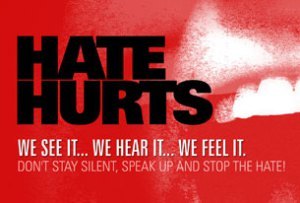
from: http://www.calgary.ca
Okay, Followers/Readers and Other Peeps: Weigh in! What do you believe/do?
Please leave comments on this blog! Thanks! Best to you all!
1) Should we authors all just “be polite” when confronted with reviewers’ prejudices?
2) Should we authors “be silent” when potential or actual reviewers express their biases and refuse to “serve” us at the “review” lunch counter because our books or characters don’t meet with their “approval” (don’t have a right to exist)?
3) Is it incumbent upon us all not to allow any reviewer to give or imply that their personal, political, religious or other biases as/are sufficient “reasons” for refusing to review a book? Or, do you recommend letting that go unchallenged?
4) Does simply having LGBT characters make a book “unfriendly” to “families” and/or inappropriate for youth?
Filed under: Indie or Self-Publishing, Opinions, Personal stories, Reviews Tagged: Author, authors, bias, blacks, cis-gender, Discrimination, family-friendly, gender, heterosexuality, Jews, LBGT, PG-13, prejudice, reviewers, reviews, sexual orientation, women







August 11, 2015
Bisexual, Female, Western and Buddhist: There are a lot more of us than you might think!
Bisexual, Female, Western and Buddhist: There are a lot more of us than you might think!, by Sally Ember, Ed.D.: written in response to Black, Bisexual, and Buddhist: Zenju Earthlyn Manuel is not afraid to embrace who she is. by Kimberly Winston, August 05, 2015
http://www.tricycle.com/blog/black-bisexual-and-buddhist
Zenju Earthlyn Manuel relates that she “often sees surprise in the faces of the students as she is introduced.” She believes this is due to the fact that “she doesn’t look like many of them expect. She isn’t Asian. She isn’t a man. And she isn’t white.”
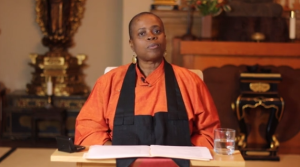
Zenju Earthlyn Manuel, photo from TRICYCLE article in online Buddhist magazine, http://www.tricycle.com/blog/black-bisexual-and-buddhist
She recently published: The Way of Tenderness: Awakening Through Race, Sexuality, and Gender, known here as “her second book of dharma, or Buddhist teachings, published in February by Wisdom Publications. In it, Manuel, who follows the Zen tradition, calls on Buddhists not to ignore those ways they may be different, whether it’s because of their color, gender, or sexual orientation.”
She and others call this idea a “‘multiplicity of oneness’—–[which] is somewhat controversial within Buddhism, where the teachings have tended to focus on moving beyond the physical to find the spiritual. But Manuel and a handful of other Western Buddhists—–including a number of African-American teachers–—are embracing the idea as crucial to enlightenment, a state free from anxiety that is the ultimate goal of Buddhism.”
Manuel and I have a lot in common, so I felt moved to respond to this article about her and her teaching, her writing and her spiritual life. I resonate with some aspects; others are quite different for me.
Manuel is 62; I am about to be 61. That means we are contemporaries who are natives of the same country.
She reports that she “has had a multiplicity of lives, all of which inform her work.” My C.V.—my academic and total resume—is over seven pages long. I have also moved over thirty times, having lived in states on both coasts, the midwest and the southwest of the USA. These varied aspects of my professional and personal lives must constitute a “multiplicity,” don’t you think?
Her personal history includes “violence, poverty and prejudice,” which my life contains, also. Heavier on the violence and prejudice than the poverty, for me, but all were there.
Manuel states that she has “been an activist since the tumultuous 1970s”; I started being a vocal, active feminist activist while still in grade school, moved into anti-war and anti-nuclear power activism, continued with feminism and got into reproductive rights activism and other issues as well. I started earlier by about 10 years, but then we both kept on keeping on.
Manuel says that she “has also known fear and rejection because she is bisexual,” but I mostly do not have that experience, perhaps because I didn’t “come out” publicly as bisexual until the 1990s, when it seemed almost no one cared anymore and I was a confident adult with a supportive community and family. I did lose a female friend in college in the early 1970s when I clumsily invited her to be my lover, but usually I did not experience either rejection or fear due to my sexual orientation. Not everyone I approached agreed to be my lover, but their rejections had nothing to do with my being attracted to both genders. So, our lives diverged there significantly.
She “was raised a Christian but discovered Buddhism in 1988,” whereas I was raised Jewish and discovered Buddhist in the early 1980s. However, I had already been meditating in the Transcendental Meditation (T.M.) tradition since 1972. Similar, but not the same, here.
Mostly, though, we share significant components of our cultural, personal and historical location and background. The major difference is that she is Black and I am White/Anglo. Our other intersecting social identities create affinities that few other commonalities could, especially since our experiences led us both to become immersed seriously and deeply in Buddhist practice.
Appallingly, however, she had the misfortune to have had a couple of Zen teachers who “suggested if she ‘dropped the labels’ of ‘African-American,’ of ‘bisexual,’ of ‘woman,’ she would ‘be liberated.’ That is ridiculous and has nothing to do with authentic Buddhism. I’m sorry she had those teachers or allowed them to affect her. Obviously, by trying to accomplish this (the impossible), she was not “liberated.” Furthermore, these attempts did not ease her suffering; in fact, she reported that she became more unhappy.
Eventually, she discovered on her own what Tibetan Vajrayana Buddhism (my tradition) has always taught: embrace everything, cling to nothing. While bushwhacking her own path through Zen traditions that were not friendly to her, she arrived at, in her words: “’complete tenderness’—–the experience of walking through her pain, knowing it, living with it, but not being controlled by it—–by confronting her suffering caused by her upbringing and identity as an African-American bisexual woman.”
I challenge this idea, though, that her suffering was “caused” by her identities at that point. I would conclude instead that her suffering was exacerbated early in her Zen journey by the ignorance and arrogance of those Zen teachers who misdirected her, then aggravated by her willingness to follow their misdirections for too long. It isn’t who she was that was the problem; it’s he ways a few teachers positioned who she was with respect to her spiritual path that caused her pain.
Despite being misled by some teachers, Manuel continued within Zen all the way to becoming ordained as a Zen Priest, when she was “given the name ‘Zenju,’ which means ‘complete tenderness.’” She now leads a small, all-female sangha that meets where she lives, in Oakland, California (near San Francisco), many of whom are also identifying as women of color.
I’m glad she found a way through all that, but it was so unnecessary. There are many USA-based Zen sanghas, some right near her that I am personally aware of, in which she would not have had those experiences. We could say it was her karma to have had those encounters, and we’d be correct, since everything we experience is always due to our karma.
But, it is not inherent to the nature of Zen or Buddhism to treat students in those ways. I need to emphasize this truth, since it appears from this Tricycle article and perhaps her book (I haven’t read it, so I’m not sure) that it is inevitable that students of backgrounds similar to hers will encounter prejudice and extreme difficulties due to their social identities everywhere they go in Buddhist communities. Simply not true.
I have observed, though, that too many Buddhist communities in the USA and Canada are populated by a disproportionate number of middle- and upper-class Whites/Anglos in comparison to the number of participants from other ethnicities and class backgrounds. I’m glad to say that these imbalances have been recognized by most leaders and other members: many sanghas are doing extensive outreach to rectify them.
I don’t know if Manuel’s Oakland Zen sitting group is deliberately all women or intentionally mostly women of color; perhaps it is open to everyone, but her being who she is, as the teacher, attracted more practitioners similar to her. That does happen, that spiritual teachers attract students who see themselves as similar to their teachers.
The only similarity that actually matters, though, is that we are all human and we all need to train our minds, develop more compassionate hearts, and liberate ourselves from delusions that cause suffering. Therefore, I believe deliberately segregating ourselves by gender, class, background or any other social identity is a mistake when it comes to creating and maintaining spiritual community. I know there are specific occasions when such segregation can be useful or necessary, but mostly, let’s not.
Clearly, the Buddhist path works well for Manuel and she believes it can work well for other women of color, bisexual or not. In that, we agree.
The Buddha supposedly taught over 84,000 types of meditation so that each individual who wants to practice will be able to find a path that works. In a large enough community with sufficient numbers of paths and teachers, I’m sure that is possible: everyone who wants to learn to meditate in the Buddhist tradition could do so.
Northern California, USA, is such a locale, with dozens or even hundreds of Buddhist teachers and sangha options scattered throughout the rural, suburban and urban areas, each slightly or very different from the other. I used to live there and I miss it a lot.
St. Louis, Missouri, USA, is not such a locale. It is not bereft entirely of Buddhists or Buddhist communities, but there is none in my exact tradition. I find that I am not so interested in attending the groups that are dissimilar. I enjoy meditating on my own just fine. I do miss my sangha and those important, guiding interactions, but not enough to join some other group, yet.
Meanwhile, this female, bisexual Buddhist who was raised Jewish and is White/Anglo is meditating and attempting to liberate in this lifetime alongside or including, but not despite, my social identities. I am lucky to have occasional conversations with my spiritual teacher, Lama Padma Drimed Norbu, by telephone, and regular contact with geographically distant sangha members via SKYPE, social media and email.
May all beings benefit. I wish you all the best in your practices.
Filed under: Buddhism, Meditation, Opinions, Tibetan Vajrayana Nyingma Tagged: Anglo, bias, bisexual, Black, Buddhism, Buddhist, class, compassion, ethnicity, feminism, feminist, gender, meditation, poverty, prejudice, race, racism, sangha, sexual orientation, spiritual, Tibetan Buddhism, Vajrayana, violence, White, Women of Color, Zen







August 10, 2015
What is it like to host a live talk show? My guest post on Inger Kenobi’s site!
What is it like to host a live talk show?.
ALSO: watch Inger’s and my Episode 20 on CHANGES: https://www.youtube.com/playlist?list=PLPbfKicwk4dFdeVSAY1tfhtjaEY_clmfq and look: OPENINGS 8/26 and beyond! Welcome new authors of any age, genre, publication method!
Watch conversations with my previous CHANGES guests any time!
Learn more about and get yourself on or recommend someone to be scheduled as a guest for CHANGES conversations between authors: http://sallyember.com/changes-videocasts-by-sally-ember-ed-d/
Filed under: CHANGES Episodes, Personal stories Tagged: *CHANGES*, *CHANGES* conversations between authors, authors, G+ HOA, Guest Blog post, guests, Inger Kenobi, Sally Ember, Talk show, YouTube







August 5, 2015
Why I Started a LIVE Talk Show: *CHANGES* conversations between authors on Google+ Hangouts On Air (HOA) and YouTube
“Why I Started a LIVE Talk Show: CHANGES conversations between authors on Google+ Hangouts On Air (HOA) and YouTube”
originally posted on http://www.asidefromwriting.com on July 6, 2015
In early April, 2014, I had just completed and uploaded Volume II, This Changes My Family and My Life Forever, of my science-fiction/romance/ multiverse/ utopian/ paranormal (psi) ebooks in The Spanners Series for adults, New and Young Adults, and joined two new writers’ groups in the East Bay (one in Berkeley and one in Hayward, California, where I had been living), when I was in a terrible accident. The resulting broken nose has been healing fine and didn’t require surgery; the concussion has proven to be a lot more problematic.
For several months, it was as if I were in a fog. I wasn’t allowed to do any serious computer work, reading or thinking (I had been about halfway through Volume III, This Is/Is Not the Way I Want Things to Change, when I got hurt). Since I couldn’t wear my glasses without causing myself enormous pain (glasses would be sitting on the broken nose, right?), and I was overwhelmingly aphasic, exhausted, confused and injured, unable to process much, the respite from writing, reading and working seemed necessary. The accident had also caused extreme damage to my arms, hands, shoulders and upper back, so keyboarding wasn’t all that feasible, anyway. Plus, when I did type, I made more errors than words, typed very slowly (usually over 100 WPM; then, about 40 WPM, with numerous mistakes).
However, once the enforced hiatus was over, I still couldn’t return to my regular life. My memory was horrible, both short- and long-term. I couldn’t find words, or the right words, to speak or write. I no longer sounded as if I were drunk, but I was still extremely slower and less able, all around, than I had been prior to the brain injury. I usually function in the top 10 percent of intellectuals, with an extremely large vocabulary and many types of intelligence. I had been fortunate, up until the accident, to be a wide reader of many subjects, with both formal and informal education beyond the doctoral level and a larger variety of knowledge, experiences and insights than most people. Post-concussion, I was barely above-average and often, not even that.
Before the injury to my brain, I had been writing my fiction series quite quickly, often exceeding 2,000 words per day. My creativity seemed boundless, my energy matching it. Volume I’s first draft had been completed in under two months, and it was over 130,000 words. I had developed a spreadsheet to record my (very brief) notes on my series’ dozens of human, animal and alien characters, multiple timelines, overlapping realities, historical and future events and people, but most of the series’ details and plans had been in my brain which had been injured to the point of being severely compromised.
In July of last year, I discovered all I could create were short, nonfiction blog and other posts, and it took “forever” to finalize each one, since I typed sentences that were riddled with errors. Each post needed to be proofread multiple times. I could barely read others’ blogs and reblog/share, almost couldn’t read short pieces/stories.
Yes, after a few months I was improving and could do these with increasingly better understanding, but I still couldn’t return to my fiction series. My “executive functions” and “working memory” were still extremely low-performing due to the post-concussion syndrome I had been diagnosed with in June.
I wasn’t well enough to return to my “regular” life of work or writing, but I was well enough to be bored. Luckily, I had discovered Google+ the previous year. During the winter and spring of 2014, I had been attending Hangouts On Air (HOAs) somewhat regularly.
After my accident, watching videos was about the only thing I could do, since reading, writing and other glass-wearing activities were excluded. I attended and participated (when that was allowed) in many HOAs by leaving comments, questions, and interactions with others also viewing or presenting, on topics ranging from books, book marketing, authors, writing, marketing, social media, spirituality/meditation and more. I watched most on Google+, but they were also archived so I could watch those I missed on YouTube, where I found even more entertaining, informative videos. (Find me on Google+ as Sally Sue Ember)
I got into watching one HOA in particular, Lights, Camera, HOA!, run by an excellent trio of women: Meloney Hall, Rayne Dowell and Sheila Strover.
After I attended a few shows, Rayne read Volume I of my series and reached out to invite me onto the show to learn more about being in/on a HOA. The entire reason for this show’s existence is to help newbies (like me) get comfortable with the HOA format and technology, both on- and off-camera. I LOVED it! What a great service this show provides. THANK YOU! https://plus.google.com/u/0/+Bigupticksociallightscamerahoa/about
As a former actor/performer, being “on camera” wasn’t hard for me. As a writer/author, being able to interact with viewers LIVE was so much better than having readers I almost never hear from or meet. I was hooked on HOAs and wanted my own. I learned everything I could in the next several months, wondering if I’d be able to manage my own show.
What could I have a HOA about, exactly? There were an infinite number of choices. By then, I had been interviewed on several radio shows online and submitted many “author interview” posts to others’ websites, so I was familiar with that format and was beginning to feel it was somewhat overused. Frankly, and no offense to the current website(!), I find most author interviews to be awfully repetitive and, well, boring.
I did NOT want to interview authors, but I wanted to meet more authors and talk about writing as well as many other interesting topics. By the end of July, four months post-injury, I still couldn’t write for my series, but I was able to talk better and listen very well. I decided to launch in August and to have a show that I would want to watch.
Since I wanted to be around other writers and hear about their experiences, hoping to be entertained and inspired until my own writing would (hopefully) be accessible to me again, I posted on Twitter, Facebook groups and in general, Pinterest, LinkedIn, and Google+ communities to invite authors to be guests on CHANGES conversations between authors. I also ranged around to those sites that posted award winners in science-fiction, particularly, and invited many of those authors on my show as well.
The response has been more than gratifying. I welcomed Dr. Shay West as my first guest for my August 6, 2014, premier Episode, with several more super authors scheduled to be on subsequent shows. Since then, with a few planned and even fewer unplanned exceptions, I have had an Episode each week. The live show airs three or four times per month (with one week off, to rest) on Wednesdays, 10 – 11 AM Eastern time, USA, and TODAY, August 5, 2015, I air my one-year anniversary show!
Amazing authors have been guests on CHANGES (http://goo.gl/1dbkZV on my website for full schedule of past and upcoming guests). I have had guests who joined me live and/or hail from France, Spain, England, Scotland, Ireland, Germany, Canada, Israel, Guyana, and many states in the USA. The authors I have talked with enrich me weekly (and my viewers as well, I hope), writing in every fiction genre and including those who also write nonfiction, plays, screenplays and poetry.
Ethnically, my guests have been American mixed-Causasian, African-American, African-Jamaican, Spanish, English, Indian (continent, not tribe), Russian, Jewish, German, Norwegian, Israeli, Guyanan, Irish, and Greek (so far). Editors, publishers (magazine and book), and translators, with an age range, as of today, August 5, 2015, of 15 – 78 years old, are in my CHANGES guests club.
Our conversational topics list is too lengthy to include here, but has been exactly as I had planned: wide variety, high-level subject discussions that are informative, entertaining, insightful, funny and poignant. My guests and I share personal and professional stories, discuss books and writing, publishing and editing, book cover artists and much more.
I am quite happy to say that, as of August 5, 2015, CHANGES Episodes (now up to 37, http://goo.gl/1dbkZV on YouTube) have garnered audiences as large as over 1000 in one day, totalling over 3600 views, so far.
My YouTube channel went from having 2 to almost 50 subscribers. I now have over 3000 followers on Google+ and Facebook, each (although some are the same people, I’m sure), and over 5000 on Twitter. Pinterest followers’ number has quadrupled; so has LinkedIn’s.
I know these are small numbers compared to many, but I’m happy that my network is growing. We receive many compliments, positive comments and excellent questions for each CHANGES Episode from viewers who watch live or later, and more watch weekly.
Since starting CHANGES, I’m delighted to report that downloads of Volume I of my series, which is permafree since I uploaded Volume II (right before my accident), are steady. I do wish for better sales for Volume II, but I’ve heard a series has to have at least three books released “to really take off.”
What’s Next?
CROWDFUNDING to meet my Goals
—I wish to convert the *CHANGES* videocasts into podcasts, for those who prefer to listen-only, but the podcast hosting sites are not free.
—I also wish to pay for my next book covers,
—I need to buy better equipment for my home videocasts, and
—I must keep writing.
However, the concussion has severely limited my ability to work and I am in deep debt. If you’d like to help, http://www.patreon.com/sallyember has a video about my goals and rewards to donors in which I sing (really; not so well, but, hey; I’m not a professional singer!), and more information.
$4 gets you a free ebook; larger donations earn you deep discounts on professional editing, proofreading and writing tutor services, all of which can do well, despite the concussion.
Concussion Recovery News
As of May, 2015, I am back to writing new parts of Volumes III and IV! Slowly, much more laboriously, with an ongoing need for referrals to notes and dictionary, thesaurus and spell-check than remembering going on, but glad to be writing!
I wish I could open up my brain and retrieve the Spanners Series ideas that had been so accessible, so easily before the concussion and look them all over, but…
The network of authors, book bloggers, book marketers and other writers I have been developing over the last two years has blossomed into a group I can call upon for help, advice, and exchanges. That has proved amazingly gratifying as I trumpet my announcement, below, because many have stepped forward to play a role in this next phase.
Good news: I finished the Beta readers’ draft of Volume III, This Is/Is Not the Way I Want Things to Change, in late July! Five wonderful writers are reading it right now and will offer their sage wisdom on its improvements by late September. I then hope to be finished with the final proofed version no later than mid-October. I have already begun the cover design process with Aidana Willowraven, The Spanners Series‘ cover artist. The Cover Reveal is planned to occur on Alesha Escobar‘s site in late October. Pre-orders start 11/1/15 and the release of Volume III is scheduled for December 8, 2015!
Wish me luck!
How Else You Can Become Involved
Beta readers for upcoming draft of Volumes IV and reviewers of all Volumes welcomed! Contact me: sallyember@yahoo.com
Also, watch a few Episodes of CHANGES any time: http://goo.gl/6xjSKl Please comment on YouTube or go to the original G+ Event page for that Episode and comment/ask questions, get more info and links. I will respond!
Become/Refer a Guest! #Authors and #bloggers, especially those in sci-fi/speculative fiction, but not only those: learn more about and get yourself on CHANGES, and #Readers, recommend an #author to be scheduled as a guest.
OPENINGS 8/12/15 and later this fall! For more info, schedule and past/upcoming guests list, visit here: http://goo.gl/1dbkZV.
Also, I’ve invited former guests and others I appreciate to Guest Blog on Wednesdays, with excellent posts, so far! Check out the Guest Bloggers’ Hall of Fame on my site (see below) for previous and upcoming posts.
I strongly suggest you check out others’ HOAs as well: there are some great shows out there in Google+ land! Two good places to find them (and another great G+ community, User2User: LIVE!):
https://plus.google.com/u/0/communities/101944073205735325459 for User2User-Live!
Http://www.hangouteventscalendar.com for the HOA Calendar
For updates about and links to available Volumes of The Spanners Series, me as an author, my own and guest blogger’s posts, Patreon and much more: http://www.sallyember.com has all links and info. Look up or to the right and scroll.
May all who are ill recover and all who are in pain find comfort.
Best to you all!
Filed under: All Volumes, Beta readers, CHANGES Episodes, G+ HOAs, Google HOAs, Gratitude, Indie or Self-Publishing, Personal stories, Reviews, The Spanners, This Changes Everything, This Changes My Family and My Life Forever, This Is/Is Not the Way I Thought Things Would Change, Volume I of The Spanners, Volume II of The Spanners, Volume III, Volume IV, Writing Tagged: *CHANGES*, *CHANGES* conversations between authors, beta readers, blogging, book covers, brain injury, crowdfunding, ebooks, editing, free, G+ HOA, Google +, Google+ Hangout On Air, HOA, Patreon, permafree, post-concussion syndrome, proofreading, reviewers, Sally Ember, series, Shay West, The Spanners Series, traumatic brain injury, writing







August 2, 2015
Please pray and send positive thoughts to save all beings from wild fires
from Chagdud Gonpa Rigdzin Ling
(my dharma center)
August 2, 2015
“Dear Sangha,
“As you may have heard, there are over 60 fires in Trinity County [northern California, USA, between Redding and Eureka] that began just a few days ago. We are safe here at Rigdzin Ling, but there are fires in very close proximity to us and we are engulfed in heavy smoke. We are preparing for changes that may occur over the next several days if the fires have not been contained. We are asking the sangha to make prayers at this time. Many sentient beings will die from these fires and many people’s lives are at risk.
“Please pray to Guru Rinpoche and Tara. You may do so by reciting “Barchad Lamsel” from Galaxy of Heartdrops, “Jetzun” prayers from the concise daily Red Tara practice, and the “Prayer to Guru Rinpoche to Dispel Elemental Disturbances. [Find prayer here and below: http://goo.gl/yYTRBF or http://chagdudgonpa.org/wp-content/uploads/2015/08/prayer-to-guru-rinpoche-dispelling-elemental-disturbances.pdf]
“We will update our Facebook page regularly for any changes to the conditions at Rigdzin Ling.
“Thank you for your prayers.
In the Dharma,
The Rigdzin Ling Sangha”
A Prayer to Guru Rinpoche to Dispel Fire and Other Elemental Disturbances
SA CHHU ME LUNG JUNG WAI BAR CHHED KYIY GYU LU NYEN CHING JIG PAI DU JUNG TSE
When our illusory bodies are threatened with destruction because of obstacles and disturbances of the earth, water, fire, and wind elements,
YID NYIY T’HE TSOM MED PAR SOL WA DEB OR GYAN JUNG WA ZHI YI LHA MOR CHAY
I supplicate you without any doubt or uncertainty. When Orgyen comes, together with the goddesses of the four elements,
JUNG WA RANG SAR ZHI WAR T’HE TSOM MED OR GYAN PAD MA JUNG NAY LA SOL WA DEB
without a doubt the elements will be pacified in and of themselves. Orgyen Padma Jungnay, to you I pray.
SAM PA LHUN GYIY DRUB PAR JIN GYIY LOB
Grant your blessings that our wishes be spontaneously accomplished.
Extracted from the Sampa Lhundrupma within the Seven Chapter Supplication
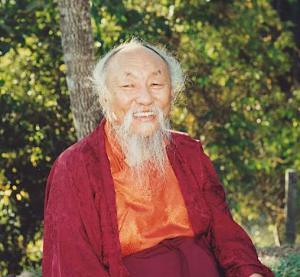
the late His Eminence Chagdud Tulku Rinpoche, 2001
Filed under: Buddhism, Support for Good Causes, Tibetan Vajrayana Nyingma Tagged: Buddhist center, Northern California, prayers, sangha, wild fires








